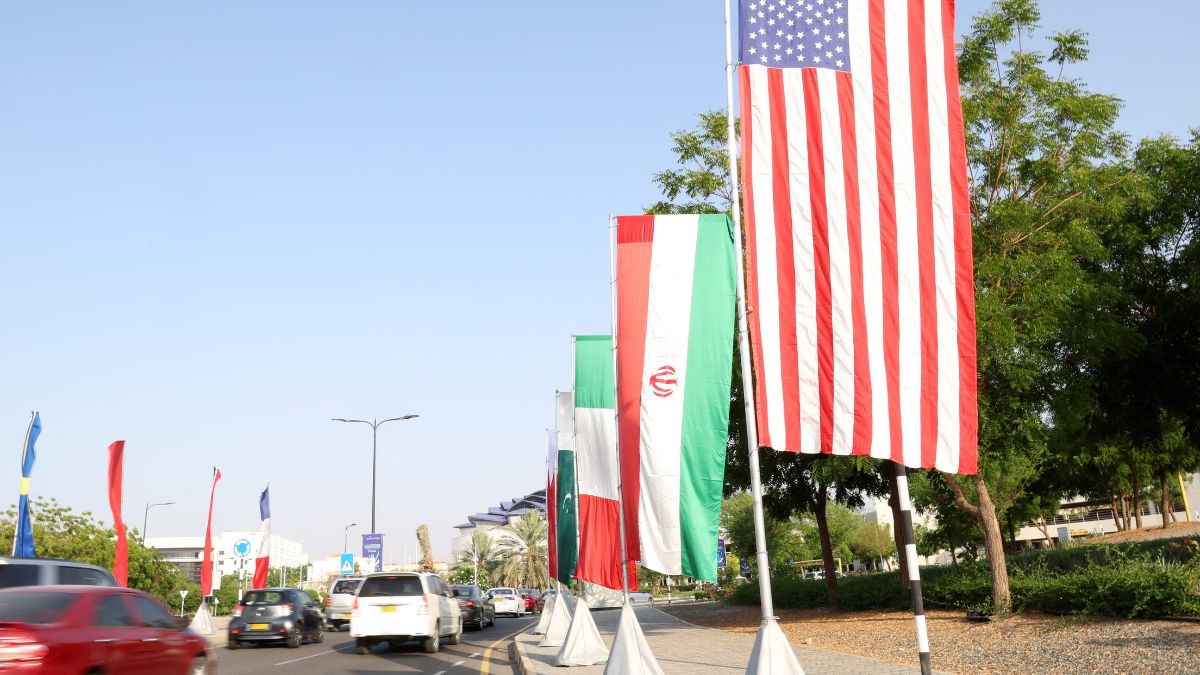Iran and US advance nuclear talks amid tensions
 The flags of the US and Iran hang on the road leading to the Muscat International Book fair on April 25, 2025 | AFP
The flags of the US and Iran hang on the road leading to the Muscat International Book fair on April 25, 2025 | AFP
Iran and the United States held a third round of indirect nuclear talks on April 26 in Muscat, the capital of Oman, marking the most detailed and serious phase of dialogue so far. The discussions, mediated by Omani officials, were the first to involve high-level technical experts from both sides.
Iranian Foreign Minister Abbas Araghchi and President Trump's Middle East envoy Steve Witkoff led the negotiations, which lasted around six hours. This latest meeting followed two earlier rounds in Muscat and Rome on April 12 and 19, respectively, which both parties had described as constructive.
Omani Foreign Minister Badr al-Busaidi, the key mediator for the peace process, announced that talks would continue next week, with another “high-level meeting” provisionally scheduled for May 3. A senior American official said that the next round of talks would be in Europe, with Oman facilitating.
Ahead of yesterday’s session, expert-level negotiations took place in Muscat to establish a framework for a potential agreement.
“The expert-level negotiations have reached the stage of detailed specifics and mutual demands. The delegations are returning to their capitals for consultations,” Iranian state television reported. An Iranian official, speaking to Reuters, characterised the discussions as "difficult, complicated and serious," without providing further details.
Iranian Foreign Ministry spokesperson Esmaeil Baghaei confirmed that Iran’s defence capabilities and missile programme were not included in the agenda. He further emphasised Iran’s steadfast demand for the lifting of sanctions and reiterated that safeguarding Iran’s right to peaceful nuclear energy remained central to the discussions.
Speaking after the meeting, Araghchi noted that the tone of negotiations had shifted towards greater seriousness and specificity, although significant differences remained. "During the recent round of negotiations, we provided answers to the other side's questions, and the atmosphere was completely serious and work-focused," he told reporters. "It was agreed that further reviews would be conducted in the capitals ahead of the next meeting to identify ways to narrow the gaps." He urged cautious optimism, highlighting that technical teams would be strengthened according to the evolving needs of the talks.
In a statement posted on X, Foreign Minister al-Busaidi said the two sides had “identified a shared aspiration” to reach an agreement based on “mutual respect and enduring commitments.” He added that “core principles, objectives and technical concerns were all addressed” during the talks.
Technical discussions, initially scheduled for April 23 but delayed until yesterday, also took place in Muscat. Iran’s technical team was led by Deputy Foreign Ministers Majid Takht-Ravanchi and Kazem Gharibabadi, while Michael Anton, head of policy planning at the US State Department, led the American delegation. Many critics, meanwhile, pointed out that Anton lacked the specialised nuclear expertise of the officials involved in the 2015 Joint Comprehensive Plan of Action (JCPOA) negotiations.
The tentative agreement under discussion would require Iran to prevent its nuclear programme from reaching weapons-grade capabilities, in return for limited sanctions relief. However, confusion has arisen due to conflicting signals from the American side. Witkoff initially suggested that Iran could continue uranium enrichment up to 3.67 per cent for civilian purposes, but later insisted on a complete halt to enrichment activities—a stance echoed by Secretary of State Marco Rubio, who proposed that Iran import nuclear fuel for its energy needs. American National Security Adviser Mike Waltz has said the United States was seeking a total dismantling of Iran’s nuclear program, a position Tehran has deemed a nonstarter.
The two countries had previously signed the 2015 JCPOA under President Obama, which saw Iran limit its nuclear activities in exchange for sanctions relief. However, President Trump withdrew from the deal in 2018 during his first term, reinstating severe economic sanctions. Since 2019, Iran has breached the JCPOA’s restrictions, enriching uranium up to 60 per cent purity, according to the International Atomic Energy Agency—close to the 90 per cent level required for weapons-grade material.
While Tehran has expressed a willingness to negotiate some curbs on its nuclear activities in exchange for lifting sanctions, it remains firmly opposed to ending enrichment or surrendering its enriched uranium stockpile. These positions, according to Iranian officials, are “red lines” that cannot be compromised. Moreover, Tehran has rejected suggestions from European states to include restrictions on its ballistic missile programme in any new deal, asserting that its missile capabilities are purely defensive and non-negotiable.
As negotiations continued in Muscat, tragedy struck Iran’s southern port of Bandar Abbas. An explosion at the Shahid Rajaee port complex killed at least 14 people and injured over 750. According to the Iranian Interior Ministry, the blast, believed to have been caused by chemicals in storage, unleashed a towering plume of thick grey smoke. Efforts to extinguish the resulting fire were hampered by high winds, with six individuals reported missing.
Despite the serious mood surrounding the talks, there were signs of cautious optimism. A senior US official, speaking anonymously, described the Muscat discussions as “positive and productive,” noting that “further progress was made on getting to a deal.”
Travelling to Rome for the funeral of Pope Francis, President Trump struck an optimistic note, though he left open the possibility of military action should negotiations fail. “The Iran situation is coming out very well,” Trump said aboard Air Force One. “We’ve had a lot of talks with them and I think we’re going to have a deal. I’d much rather have a deal than the other alternative. That would be good for humanity.”
He added, pointedly: “There are some people who want to make a different kind of deal—a much nastier deal—and I don’t want that to happen to Iran if we can avoid it.”
Middle East